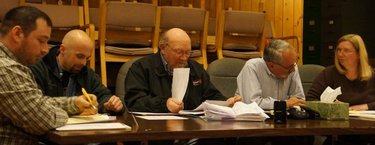Westerlo posts unopposed in election
WESTERLO — The Republicans in this rural Hilltown, dominated by Democrats for decades, have put up no candidates for the November elections.
“The town’s in such bad shape, it’s turned a lot of people off,” said Clinton “Jack” Milner, a farmer who chairs the Republican Party. He was elected to fill out a term on the town board in 2009, but was defeated in his re-election bid in 2011.
That election, the last of the Republicans’ brief foray into backing alternative candidates, saw both council seats go to Democrats, as well as the uncontested posts for supervisor and town clerk.
Milner said this week that the three candidates he had lined up backed off; he declined to name them. “Let the people who screwed it up straighten it out,” said Milner of town government.
Three of the Democrats running on Nov. 5 were appointed to their posts: councilmen William Bichteman and Theodore Lounsbury along with Highway Superintendent Keith Wright.
Kenneth Mackey, town judge, is running for a second four-year term. In 2009, he ran on the GOP line because he couldn’t get his party’s backing.
Democrats make up about half of Westerlo’s registered voters (1,084 out of a total of 2,233, according to 2012 figures from the Albany County Board of Elections). About a fifth (431) are Republicans, and almost a quarter (521) are unaffiliated. The rest belong to small parties: 126 are enrolled in the Independence Party; 58 in the Conservative Party, and the rest in other parties.
Wright was chosen by the all-Democratic town board in December 2012 to fill the vacancy left by John Nevins, who retired. Bichteman and Lounsbury were appointed to their seats in February to fill vacancies left by resigning Democrats Edward Rash and Gregory Zeh at the end of 2012.
According to the current Westerlo budget, the councilmen earn $3,825 each, the justice post pays $10,000, and the highway superintendent earns $50,000 for a full-time job.
Mackey believes there are other qualified people for the posts but, as a general rule, people today “don’t have the time to give,” he said.
The Democrats, to a man, believe they are serving the town well.
The Republicans made no formal cross-endorsements — none of the Democrats’ names will appear on the GOP line — but Milner said, “We’re satisfied with Keith Wright, Ken Mackey as judge, and also Bill Bichteman.”
Milner concluded, “I’m just hoping hardly anyone shows to vote; that will show the level of disgust.”
The issues
The Enterprise asked the town board candidates about these issues:
— Hydraulic fracturing: Since 2012, Westerlo has been reviewing hydrofracking, the process of breaking apart shale to get natural gas, that has been controversial statewide with proponents citing economic gains and critics citing pollution and health concerns. Before setting up regulations, the state is waiting for a health assessment. Meanwhile, the state’s top court has agreed to hear a case testing whether or not municipal zoning law can ban the process or is pre-empted by state law.
Whether or not Westerlo, which sits on Marcellus shale, allows fracking will be up to the town board. Candidates were asked if it should be allowed or banned and why.
— Scrap metal: Westerlo makes less than neighboring Hilltowns on its scrap metal. In 2012, the town had almost half as much as it did in 2011.
Candidates were asked if it is being stolen from the transfer station and sold by individuals or if residents are legally selling scrap on their own without taking it to the town’s station. They were also asked if further regulation is needed.
— Revaluation: Long-time Supervisor Richard Rapp estimated the town last underwent a property revaluation in the 1950s. This leaves the tax rolls skewed, causing newcomers to pay an unfair share, in violation of state standards.
“Because Westerlo has not conducted a reassessment in decades, it continues to exceed the assessment equity standard,” said Geoff Gloak, spokesman for the state’s Department of Taxation and Finance. “This means that many of the town’s property owners are paying either more or less than their fair share of taxes. The best way to ensure that all taxpayers pay only their fair share is to conduct frequent reassessments. The state makes aid available for municipalities that commit to conducting reassessments at least once every four years.”
Candidates were asked if Westerlo should undergo a townwide property revaluation and why or why not.
— Town building: Since the old Westerlo School was purchased by the town and now serves as its town hall, the building that once held the town hall and highway garage now houses just the garage and the town court. It has fallen into disrepair with a leaky roof and other maintenance needs. A citizen recently suggested it should be re-zoned for business.
Candidates were asked what should happen with the building.
— Town attorney: Aline Galgay said in June that she doesn’t go to town board meetings anymore because the board felt her answering questions from the public diverted members from getting business done.
Candidates were asked if the town attorney should attend town board meetings and what her role should be.



